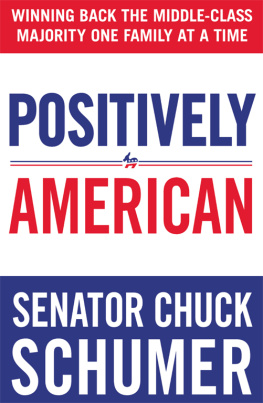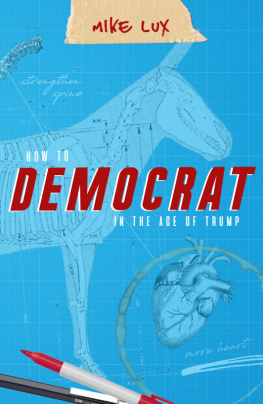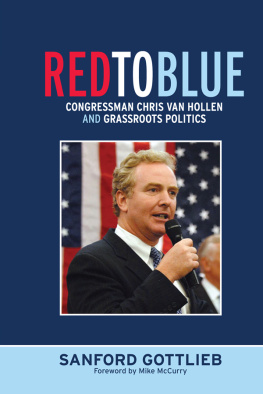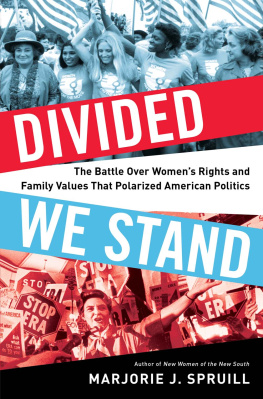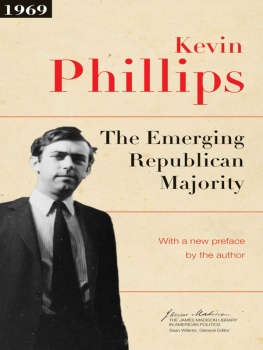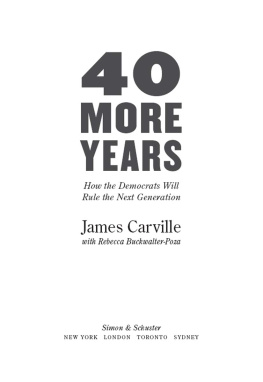First published 2008 by Paradigm Publishers
Published 2016 by Routledge
2 Park Square, Milton Park, Abingdon, Oxon OX14 4RN
711 Third Avenue, New York, NY 10017, USA
Routledge is an imprint of the Taylor & Francis Group, an informa business
Copyright 2008, Taylor & Francis.
All rights reserved. No part of this book may be reprinted or reproduced or utilised in any form or by any electronic, mechanical, or other means, now known or hereafter invented, including photocopying and recording, or in any information storage or retrieval system, without permission in writing from the publishers.
Notice:
Product or corporate names may be trademarks or registered trademarks, and are used only for identification and explanation without intent to infringe.
Library of Congress Cataloging-in-Publication Data is available.
ISBN 978-1-59451-567-5 (hbk)
ISBN 978-1-59451-568-2 (pbk)
Designed and typeset by Straight Creek Bookmakers.
Democrats Have Values, Too
On a rainy night in early November 2004, thousands of Democrats stood shivering in a downtown Boston square, waiting for a victory speech that never came. Meanwhile, hundreds of befuddled journalists huddled in tents in the areas periphery, contemplating how their networks exit polls proved to be so wrong. And in a hotel room overlooking the whole scene, a presidential campaign staff wondered when they should accept defeat.
Finally, the bad news came. The major news networks began to project that Ohio would go red, and that George W. Bush had won a second term as president. Democratic hearts collectively sank. Kerry supporters slowly filed out of the packed outdoor victory party to catch cabs home, their clothes soaked by rain and their cheeks wet with tears.
The look on many of these Bostonians faces could only be described as dazed. For themand for progressive thinkers around the countryfeelings of disappointment and dread mixed with a deep sense of confusion. After four years of divisive Leave No Millionaire Behind domestic policies and a quagmire in Iraq, the Bush administration still managed to convince a majority of American voters that the Republican Party best represented their interests.
In Fort Lauderdale, Florida, the Reverend D. James Kennedy was celebrating. As the founder of Coral Ridge
While Democrats fiercely and loudly courted new voters through organizations like MoveOn.org and America Coming Together, the Bush campaign quietly worked with religious groups around the country to register new evangelical voters and ensure they came to the polls. On Bushs last day of campaigning in November 2004, he held a rally in Ohioa state the campaign hoped would bring big evangelical numbers for Bush. Ohio ended up securing the Republican victory. That same evening, it was also one of eleven states to pass a bill banning same-sex marriage.
The impact of Bushs strategy goes far beyond the 2004 presidential election. Republicans created a much larger movement of values-based voting. The millions of evangelicals who turned out for George W. Bush voted for him not because they thought his policies would significantly improve their lives; they cast their votes based on their religious identity, even when Bushs policies would hit them in their own pocketbooks. Evangelicals have a certain view of how the world should be, based on their Christian values. They vote for the candidates who they feel will bring the country more in line with this general The Bush campaign had succeeded in casting Bush as a redeemer of traditional morality who would use his steadfast values to save America from itself.
The Kerry campaign had a different strategy to win. Following the lead of Bill Clinton in the 1996 election, the Kerry campaign employed a triangulation strategy, meant to give the candidate broad-based appeal. The strategy included moving to the right on a number of issues in an effort to pick up Independents and undecided voters. Yet, because Kerry lacked the dynamism and political acumen of Clinton, his attempt at this strategy seemed insincere and strangely comical. Pundits skewered Kerry when he claimed he actually voted for the $87 billion appropriation bill for Iraq and Afghanistan before he voted against it. Even Independents, the 26 percent of voters who were supposed to respond most strongly to the triangulation strategy, ended up splitting their votes between the two candidates.
As much as political pundits have berated Kerry for his personal mistakes, the Bush/Cheney win was actually the result of years of poor strategy by the Democrats. To fulfill its goals of triangulation, the Democratic Party had spent the Clinton years confusing voters about its ideals. Clinton masterfully moved around the ideological spectrum, tightening gun control to please liberals, and changing welfare to appease conservatives. It worked well for Clinton, who was reelected and had high approval ratings. In the long run, however, Democrats were faced with a problem: Voters had no idea what the Democratic Party was about. Republicans, meanwhile, created a larger and more forward-thinking strategy based on identity and values. And, while the Democrats triangulated to the right, the Republican strategy did not rely on moving left.
Triangulation led Democrats to abandon their populist agenda. They pursued policies of fiscal conservatism so as not to be seen as supporting big government. The party embraced a new paradigm of economic elitism and faced a credibility gap when it fought the Bush administrations tax cuts for the rich and provoucher education program. In the end, the Republican Party deflected any criticism for its divisive antipopulist economic policies and ensured that the political conversation focused on cultural issues in a values framework.
Although some strategists have encouraged the Democratic Party to adopt a progressive values platform, most of the party seems unconvinced that running campaigns based on generalized values is the key to success. Many leading Democrats even feel that Democratic losses are the result of not triangulating enough, and they urge candidates to push even more conservative positions on social and military issues. The most misinformed Democrats, however, believe that a moral values approach to politics in America can never exist outside of a Christian or religious framework. These Democrats are not only wrong but also a dangerous influence on the rest of the party. If Democrats refuse to start looking at issues in a values framework they will squander an opportunity to lead America into a new era of progressivism.
Gender, Values, and the Democrats
As the only group targeted by a political party using a value-based strategy, evangelicals are seen as the only people who match their actions and politics to their values. Values, however, are a universal human phenomenon. In their simplest form, values are socially constructed views about how the world should be. In 1651, Thomas Hobbes wrote about the subjectivity of values and how we shape our values to fit our ideas of what makes a perfect society.


